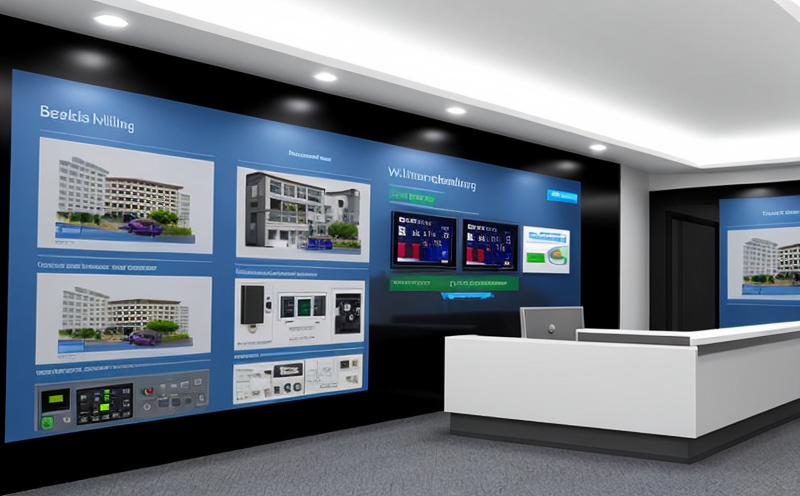EN 16001 Building Energy Management Verification
The European Standard EN 16001 provides a framework for verifying that building energy management systems (BEMS) are functioning as intended. This verification process ensures the system meets its design objectives and contributes to overall energy efficiency within a building or infrastructure project. For quality managers, compliance officers, R&D engineers, and procurement teams involved in smart building projects, understanding EN 16001 is crucial for ensuring regulatory compliance and optimizing energy use.
The standard focuses on the verification of BEMS, which are critical components in modern buildings designed to optimize the efficiency of heating, ventilation, air conditioning (HVAC), lighting, and other services. The process involves several stages that ensure the BEMS is meeting its intended performance criteria. These stages include initial verification, continuous monitoring, and periodic re-verification.
Initial verification is conducted upon installation to confirm that the system meets the required design specifications. This includes checking for proper integration with other building systems, ensuring compliance with relevant standards like ISO 50001, and validating the accuracy of energy consumption data. Continuous monitoring involves ongoing checks during operation to identify any deviations from expected performance.
Periodic re-verification is carried out at specified intervals to ensure ongoing compliance and effectiveness over time. This process helps maintain optimal energy efficiency throughout the lifecycle of the building. By adhering to EN 16001, organizations can demonstrate their commitment to sustainable practices while ensuring regulatory compliance.
The standard also emphasizes the importance of continuous improvement in BEMS performance through regular reviews and updates based on new technologies and best practices. This proactive approach ensures that buildings remain at the forefront of energy efficiency advancements. For R&D engineers involved in smart building projects, this verification process offers valuable insights into system performance and areas for innovation.
Compliance officers benefit from EN 16001 by providing a clear path to meet regulatory requirements related to energy management systems. This standard helps them ensure that their buildings are not only compliant but also optimized for maximum efficiency, reducing operational costs and environmental impact.
In summary, EN 16001 is essential for ensuring the integrity and effectiveness of BEMS in smart building projects. By adhering to this standard, organizations can enhance energy management practices, improve sustainability efforts, and comply with international regulations. This process is particularly important as the world continues to focus on reducing carbon footprints and promoting green initiatives.
Applied Standards
- EN 16001:2020 - European Standard for Energy Management Systems in Buildings
- ISO 50001:2018 - International Standard for Energy Management
- ASTM E2347-19 - American Standard for BEMS Verification Practices
The application of these standards ensures a comprehensive and consistent approach to verifying building energy management systems. By aligning with EN 16001, organizations can ensure their BEMS meet the highest industry standards.
Benefits
The implementation of EN 16001 offers numerous benefits to stakeholders involved in smart building projects. Quality managers benefit from a structured approach to verifying BEMS, ensuring that all systems are functioning optimally and meeting design specifications. Compliance officers gain clarity on regulatory requirements, making it easier to ensure compliance with international standards.
R&D engineers can leverage the insights gained from EN 16001 verification processes to refine and improve system designs continuously. This iterative process ensures that new technologies and best practices are integrated into BEMS, enhancing overall performance and efficiency.
For procurement teams, adherence to EN 16001 helps in selecting suppliers who deliver high-quality components for BEMS. This ensures long-term reliability and reduces the risk of system failures or non-compliance issues.
The primary benefit of EN 16001 lies in its ability to enhance energy efficiency within buildings, leading to significant cost savings on operational expenses. Organizations can achieve these benefits while contributing positively to environmental sustainability goals.
International Acceptance and Recognition
- European Union: EN 16001 is widely recognized as a leading standard for verifying building energy management systems within the EU.
- Nordic Countries: Compliance with this standard is encouraged to meet national sustainability goals and reduce carbon emissions.
- Brazil: The Brazilian government has adopted EN 16001 as a reference for energy efficiency in buildings, promoting its use across the country.
- Australia: While not mandatory, compliance with this standard is seen as best practice and can enhance a building's certification status.
The global acceptance of EN 16001 underscores its importance in promoting energy efficiency and sustainability within the built environment. Compliance with this standard ensures that buildings are optimized for both performance and environmental impact, aligning with international best practices.





